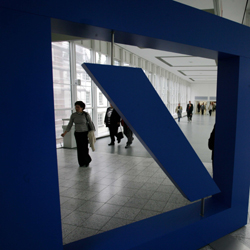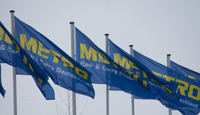ACTIONS CORNER
 Cropscience has according to its own account settled out of court with the lawyers for the growers of U.S. long-grain rice, in the legal dispute over genetically modified rice in the U.S. As the Bayer subgroup stated, the farmers concerned will be paid a total amount of up to 750 million U.S. dollars (just under 520 million euros) to settle the compensation claims. All U.S. farmers who grew long-grain rice in the period from 2006 to 2010 can take part in the program. The negotiated settlement will only be valid if the farmers who accept it account for at least 85 percent of the acreage of long-grain rice in the U.S.
Cropscience has according to its own account settled out of court with the lawyers for the growers of U.S. long-grain rice, in the legal dispute over genetically modified rice in the U.S. As the Bayer subgroup stated, the farmers concerned will be paid a total amount of up to 750 million U.S. dollars (just under 520 million euros) to settle the compensation claims. All U.S. farmers who grew long-grain rice in the period from 2006 to 2010 can take part in the program. The negotiated settlement will only be valid if the farmers who accept it account for at least 85 percent of the acreage of long-grain rice in the U.S.
 The BASF Group now need not pay an antitrust fine in the amount of 68.4 million euros imposed by the EU Commission in 2009, due to lapse of time. At the end of March in a suit the European Court had defined fundamental guidelines for the prescription, which is why the EU authority itself dispensed with a continuation of the case. Ciba and Elementis therefore had to pay no fines for participation in a cartel for so-called heat stabilizers, the Commission stated on 4 July in Brussels. The Commission considers that the BASF subsidiary and its British competitor agreed prices and allocated customers and markets among themselves, but Ciba was involved only up to1998.
The BASF Group now need not pay an antitrust fine in the amount of 68.4 million euros imposed by the EU Commission in 2009, due to lapse of time. At the end of March in a suit the European Court had defined fundamental guidelines for the prescription, which is why the EU authority itself dispensed with a continuation of the case. Ciba and Elementis therefore had to pay no fines for participation in a cartel for so-called heat stabilizers, the Commission stated on 4 July in Brussels. The Commission considers that the BASF subsidiary and its British competitor agreed prices and allocated customers and markets among themselves, but Ciba was involved only up to1998.
The Frankfurt Higher Regional Court has declared some of the decisions of the 2009 AGM null and void, as Deutsche Bank and Leo Kirch confirmed before his death on 5 July. According to information from a Kirch spokesman, the court criticized formal errors in the invitation among other things, reports Reuters. The ruling applies to the discharge to the Executive and Supervisory Boards and capital decisions of the shareholder’s meeting. In the Deutsche Bank’s opinion, however, the decision has no practical effect because the capital measures sanctioned at the AGM have already been legally registered, says the news agency.
 In the legal battle between Leo Kirch and Deutsche Bank, the bank has won a partial victory. On 19 July the Federal Court of Justice (BGH) ruled on a complaint filed by the late media entrepreneur, seeking in conjunction with four other plaintiffs to overturn the decisions of the bank’s annual general meeting in May 2008. Incorrect information on an invitation to the AGM, which “affected only the mode of participation and voting,” did not lead to the nullity of all decisions, said the BGH. Thus Supervisory Board Chairman Clemens Börsig remains in office.
In the legal battle between Leo Kirch and Deutsche Bank, the bank has won a partial victory. On 19 July the Federal Court of Justice (BGH) ruled on a complaint filed by the late media entrepreneur, seeking in conjunction with four other plaintiffs to overturn the decisions of the bank’s annual general meeting in May 2008. Incorrect information on an invitation to the AGM, which “affected only the mode of participation and voting,” did not lead to the nullity of all decisions, said the BGH. Thus Supervisory Board Chairman Clemens Börsig remains in office.
In the dispute with the United States about improper mortgage transactions by MortgageIT, the Deutsche Bank has gone on the offensive in court. The bank has now officially applied to a New York court to dismiss the U.S. government’s lawsuit, potentially worth billions. The government had accused the bank and its former real-estate subsidiary of having fraudulently accessed a government program that underwrote mortgages. Andrew Levander, attorney from the law firm Dechert, described the action as “fundamentally flawed”; Germany’s largest financial institution had taken over the property financier shortly before the company ceased trading, is the argument.
On 13 July Dexia sued Deutsche Bank before the Supreme Court of the State of New York for fraud in connection with a more than one-billion-dollar purchase of mortgage securities. Bank spokeswoman Renee Calabro said the complaint was totally unfounded. According to the application, the German bank had sold mortgage securities to the financial-services provider, although they knew that the home loans contained in them were of poor quality.
The Deutsche Bank is striving through out-of-court settlements to resolve pending cases from CMS credit ladder swaps it had sold. The bank was checking the applicability of the decision of the Bundesgerichtshof (BGH) to pending proceedings, it declared. In March, the BGH had ruled against the bank in a trial about this product. The bank had reached settlements in some cases; however, only in instances of the same type of derivatives. In addition, there was a growing number of complaints from retail investors, who had purchased similar products and want to use the Supreme Court ruling for themselves.
 In the dispute among shareholders of Media-Saturn-Holding, METRO has had a first defeat in court. The Ingolstadt District Court stated in an interim decision that the advisory panel founded in March at the request of the majority shareholder would probably have to take decisions with a majority of more than 80 percent. The retail giant wants to trim the veto of the former owners and make important decisions in the future by a simple majority in the newly established advisory panel. The court adjourned its decision to 11 October.
In the dispute among shareholders of Media-Saturn-Holding, METRO has had a first defeat in court. The Ingolstadt District Court stated in an interim decision that the advisory panel founded in March at the request of the majority shareholder would probably have to take decisions with a majority of more than 80 percent. The retail giant wants to trim the veto of the former owners and make important decisions in the future by a simple majority in the newly established advisory panel. The court adjourned its decision to 11 October.
Heinz-Joachim Neubürger expects a suspension of investigations. As part of a bribery scandal the former Siemens chief financial officer was involved in the biggest corruption scandal in German economic history. Now, the proceedings against him are to be set aside, against contributions totalling 400,000 euros to charities. Neubürger would accept the investigators’ offer, his lawyers said. The case against him for tax evasion on behalf of Siemens would then be suspended, but not the claim for damages of €15 million.
ThyssenKrupp is to pay 160 million euros less than decided in 2007 by the European Commission. The European Court of Justice ruled on 13 July that only a penalty of 320 million euros was appropriate instead of the 480 million euros originally imposed for illegal collusion with its competitors. According to the judge, the EU Commission made a mistake in calculating the amount of the fine. The breach of EU law could not be seen as a repeat offence by the same company. In the former decision the group had been wrongly classified as a repeat offender, so that the fine had been increased by 50 percent.















